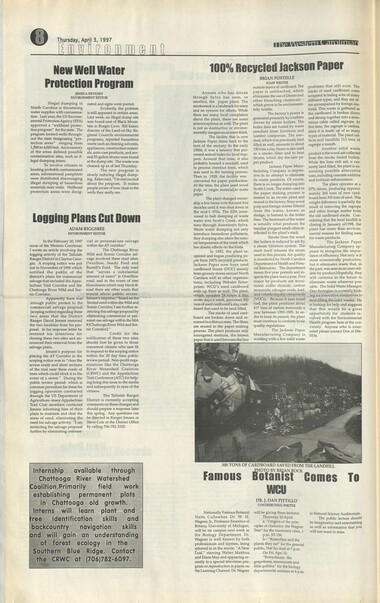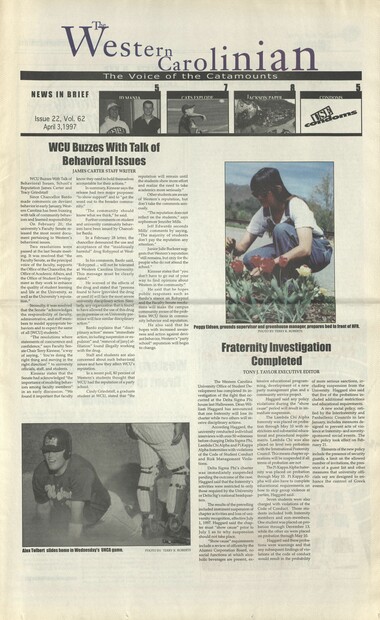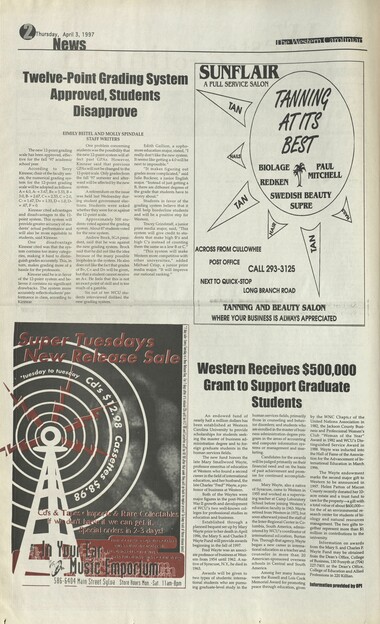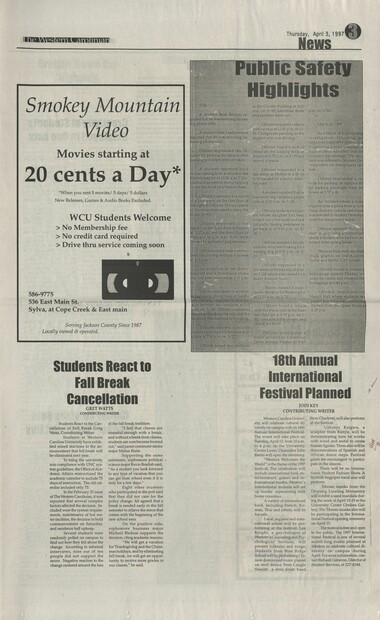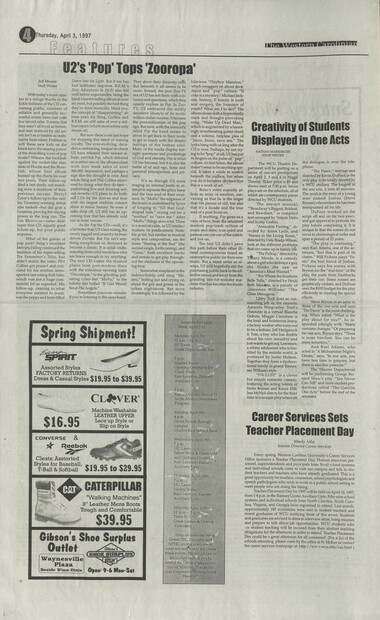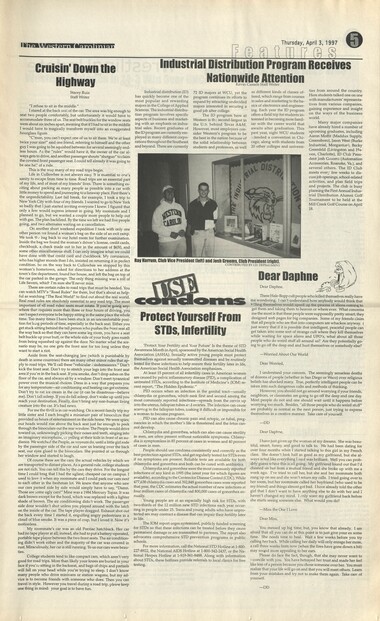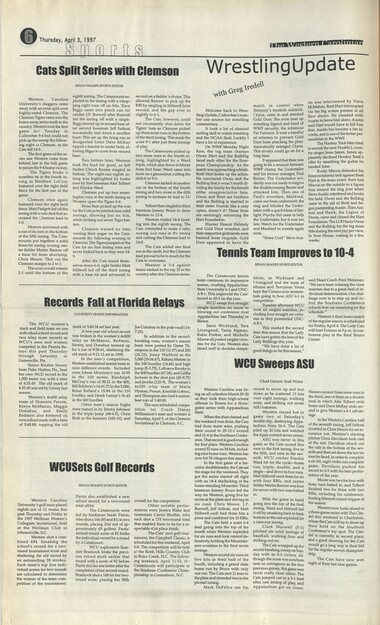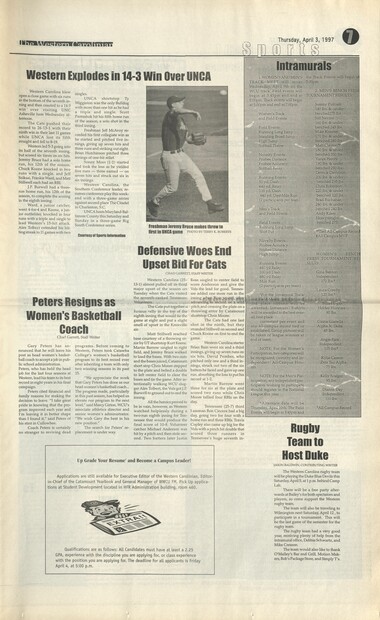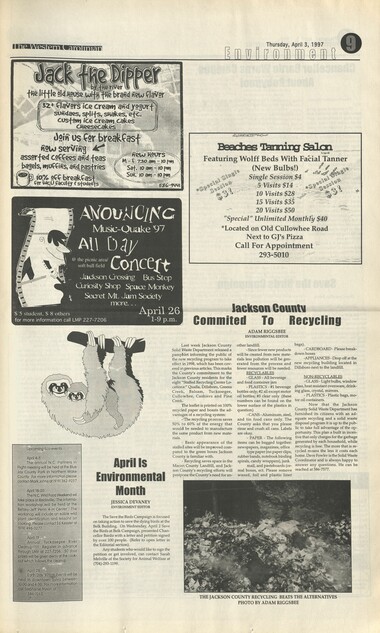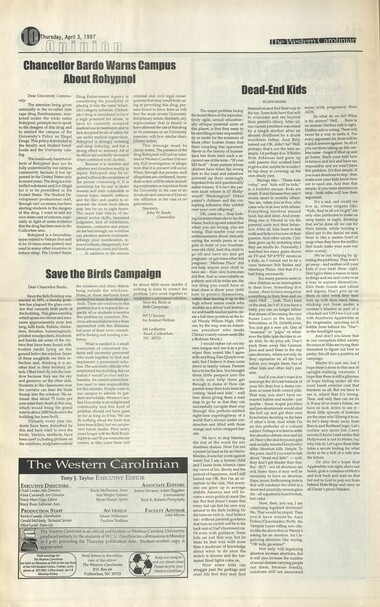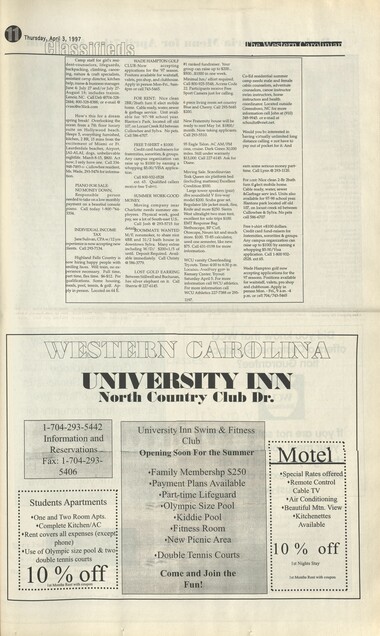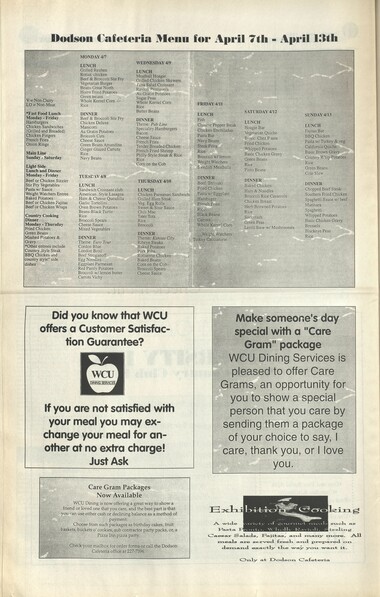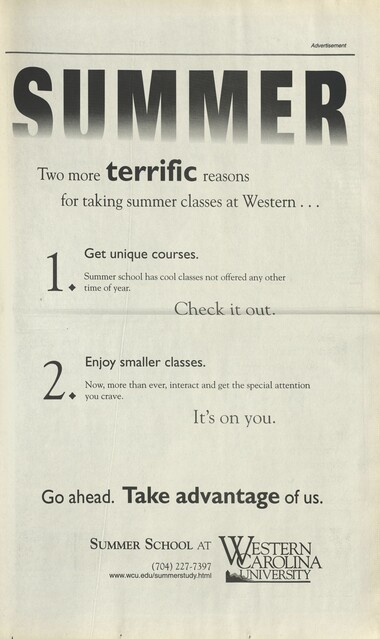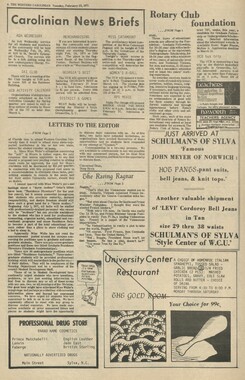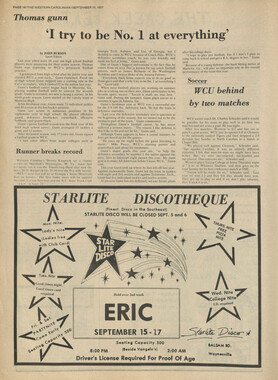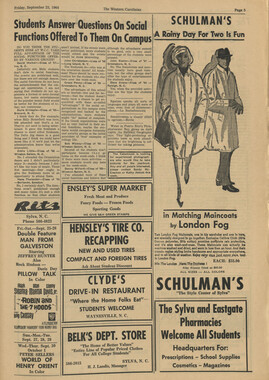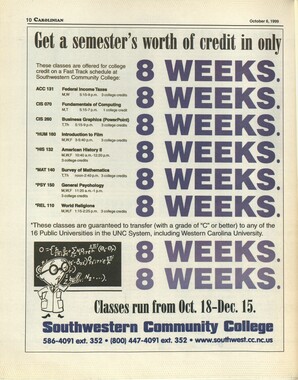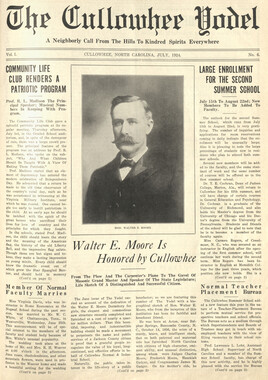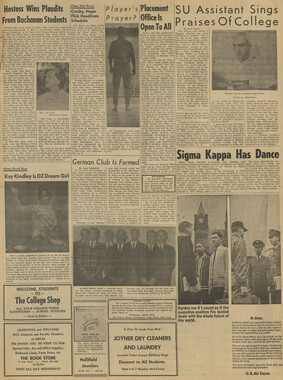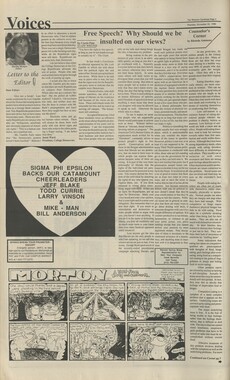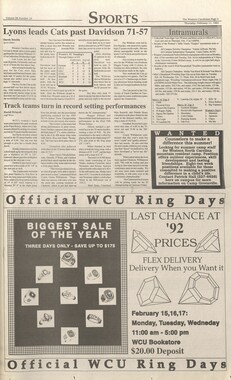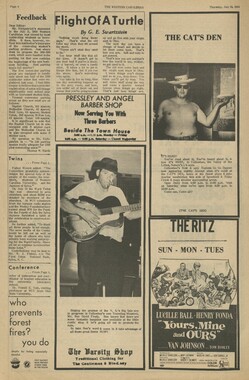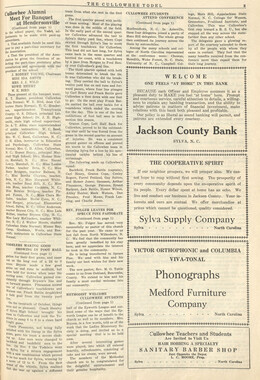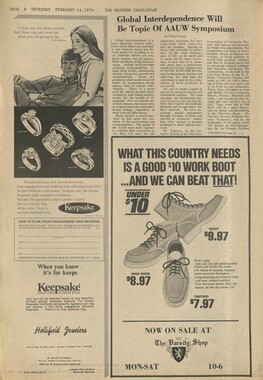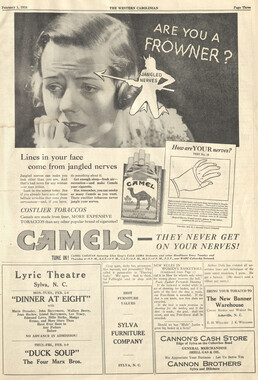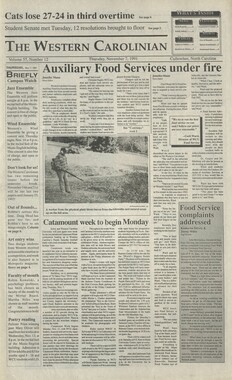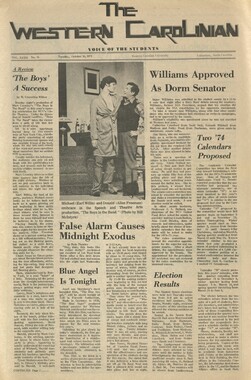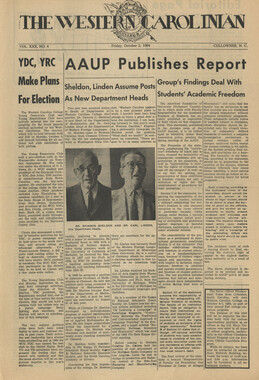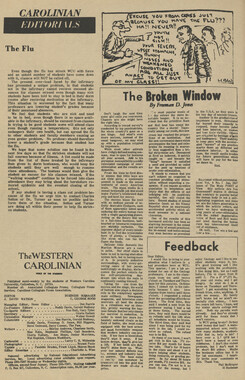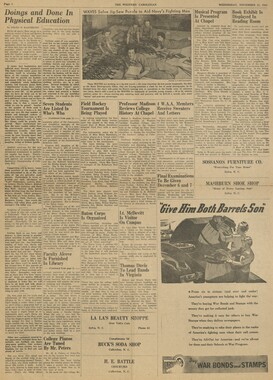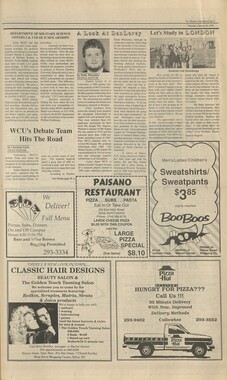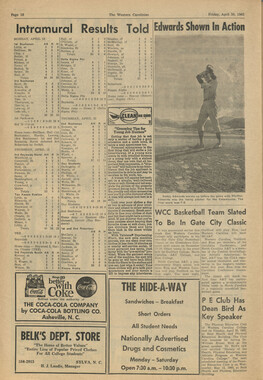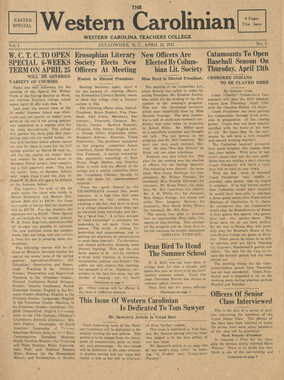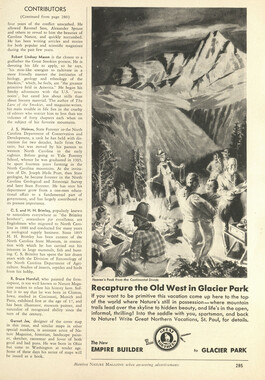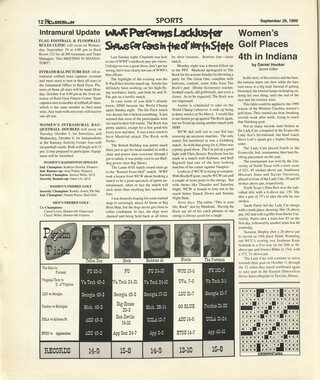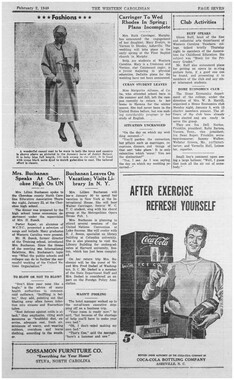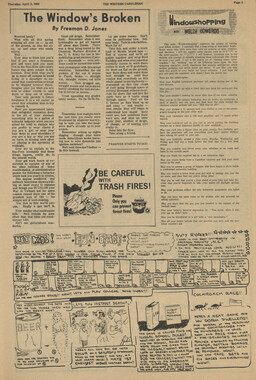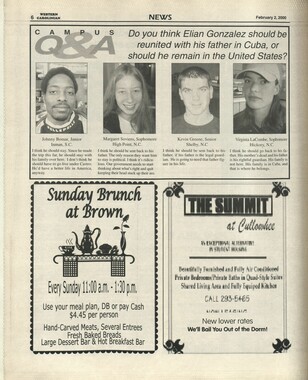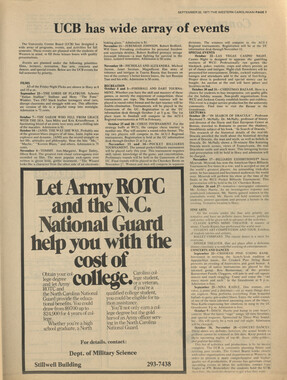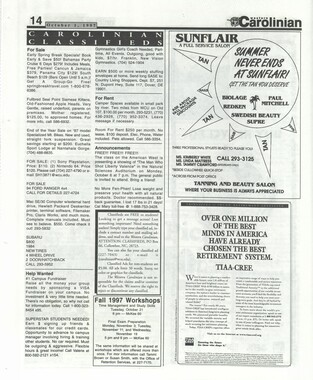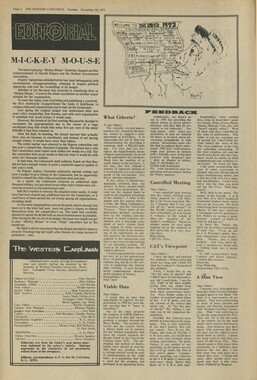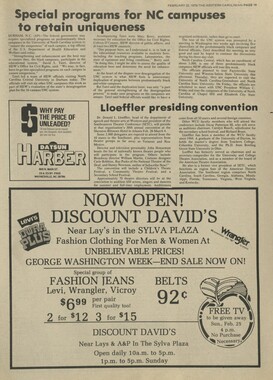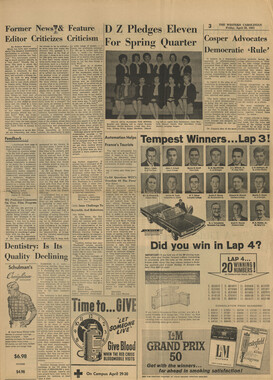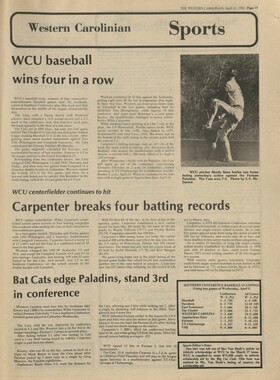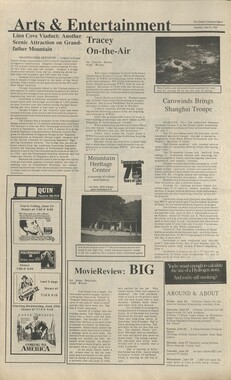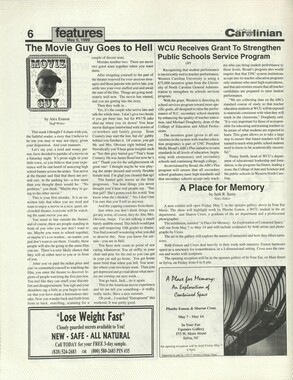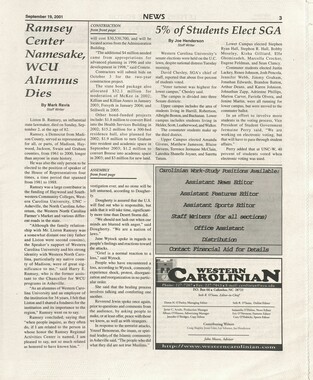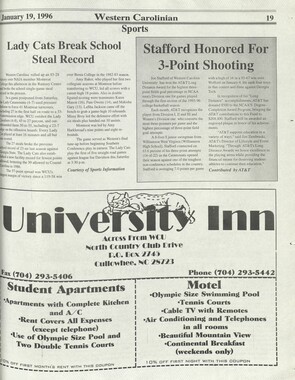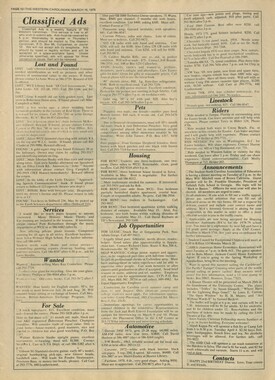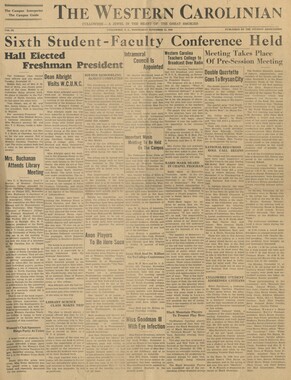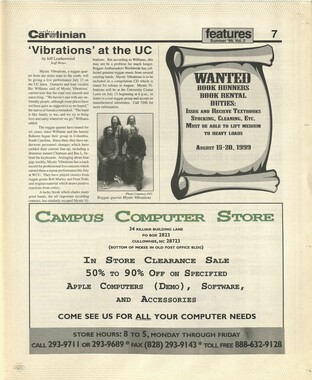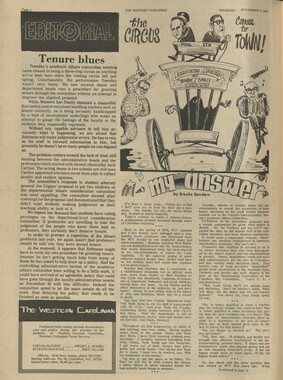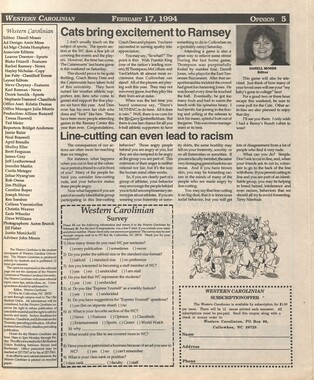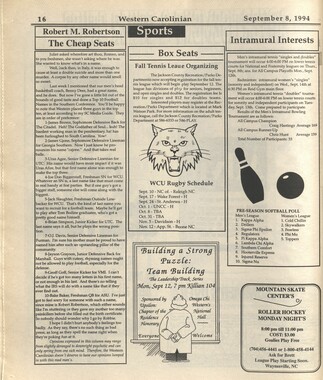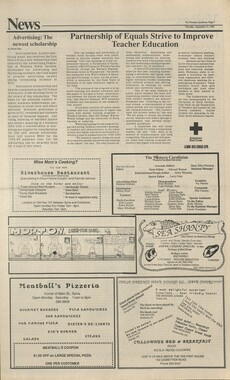Western Carolina University (20)
View all
- Canton Champion Fibre Company (2308)
- Cherokee Traditions (292)
- Civil War in Southern Appalachia (165)
- Craft Revival (1942)
- Great Smoky Mountains - A Park for America (2766)
- Highlights from Western Carolina University (430)
- Horace Kephart (941)
- Journeys Through Jackson (154)
- LGBTQIA+ Archive of Jackson County (85)
- Oral Histories of Western North Carolina (314)
- Picturing Appalachia (6772)
- Stories of Mountain Folk (413)
- Travel Western North Carolina (160)
- Western Carolina University Fine Art Museum Vitreograph Collection (129)
- Western Carolina University Herbarium (92)
- Western Carolina University: Making Memories (708)
- Western Carolina University Publications (2283)
- Western Carolina University Restricted Electronic Theses and Dissertations (146)
- Western North Carolina Regional Maps (71)
- World War II in Southern Appalachia (131)
University of North Carolina Asheville (6)
View all
- Western Carolina College (199)
- Western Carolina Teachers College (239)
- Western Carolina University (1792)
- Allanstand Cottage Industries (0)
- Appalachian National Park Association (0)
- Bennett, Kelly, 1890-1974 (0)
- Berry, Walter (0)
- Brasstown Carvers (0)
- Cain, Doreyl Ammons (0)
- Carver, George Washington, 1864?-1943 (0)
- Cathey, Joseph, 1803-1874 (0)
- Champion Fibre Company (0)
- Champion Paper and Fibre Company (0)
- Cherokee Indian Fair Association (0)
- Cherokee Language Program (0)
- Crittenden, Lorraine (0)
- Crowe, Amanda (0)
- Edmonston, Thomas Benton, 1842-1907 (0)
- Ensley, A. L. (Abraham Lincoln), 1865-1948 (0)
- Fromer, Irving Rhodes, 1913-1994 (0)
- George Butz (BFS 1907) (0)
- Goodrich, Frances Louisa (0)
- Grant, George Alexander, 1891-1964 (0)
- Heard, Marian Gladys (0)
- Kephart, Calvin, 1883-1969 (0)
- Kephart, Horace, 1862-1931 (0)
- Kephart, Laura, 1862-1954 (0)
- Laney, Gideon Thomas, 1889-1976 (0)
- Masa, George, 1881-1933 (0)
- McElhinney, William Julian, 1896-1953 (0)
- Niggli, Josephina, 1910-1983 (0)
- North Carolina Park Commission (0)
- Osborne, Kezia Stradley (0)
- Owens, Samuel Robert, 1918-1995 (0)
- Penland Weavers and Potters (0)
- Rhodes, Judy (0)
- Roberts, Vivienne (0)
- Roth, Albert, 1890-1974 (0)
- Schenck, Carl Alwin, 1868-1955 (0)
- Sherrill's Photography Studio (0)
- Smith, Edward Clark (0)
- Southern Highland Handicraft Guild (0)
- Southern Highlanders, Inc. (0)
- Stalcup, Jesse Bryson (0)
- Stearns, I. K. (0)
- Thompson, James Edward, 1880-1976 (0)
- United States. Indian Arts and Crafts Board (0)
- USFS (0)
- Vance, Zebulon Baird, 1830-1894 (0)
- Weaver, Zebulon, 1872-1948 (0)
- Western Carolina University. Mountain Heritage Center (0)
- Whitman, Walt, 1819-1892 (0)
- Wilburn, Hiram Coleman, 1880-1967 (0)
- Williams, Isadora (0)
- 1920s (57)
- 1930s (69)
- 1940s (114)
- 1950s (66)
- 1960s (314)
- 1970s (599)
- 1980s (406)
- 1990s (379)
- 2000s (195)
- 2010s (83)
- 1600s (0)
- 1700s (0)
- 1800s (0)
- 1810s (0)
- 1820s (0)
- 1830s (0)
- 1840s (0)
- 1850s (0)
- 1860s (0)
- 1870s (0)
- 1880s (0)
- 1890s (0)
- 1900s (0)
- 1910s (0)
- 2020s (0)
- Jackson County (N.C.) (2282)
- Appalachian Region, Southern (0)
- Asheville (N.C.) (0)
- Avery County (N.C.) (0)
- Blount County (Tenn.) (0)
- Buncombe County (N.C.) (0)
- Cherokee County (N.C.) (0)
- Clay County (N.C.) (0)
- Graham County (N.C.) (0)
- Great Smoky Mountains National Park (N.C. and Tenn.) (0)
- Haywood County (N.C.) (0)
- Henderson County (N.C.) (0)
- Knox County (Tenn.) (0)
- Knoxville (Tenn.) (0)
- Lake Santeetlah (N.C.) (0)
- Macon County (N.C.) (0)
- Madison County (N.C.) (0)
- McDowell County (N.C.) (0)
- Mitchell County (N.C.) (0)
- Polk County (N.C.) (0)
- Qualla Boundary (0)
- Rutherford County (N.C.) (0)
- Swain County (N.C.) (0)
- Transylvania County (N.C.) (0)
- Watauga County (N.C.) (0)
- Waynesville (N.C.) (0)
- Yancey County (N.C.) (0)
- Newsletters (510)
- Publications (documents) (1773)
- Aerial Photographs (0)
- Aerial Views (0)
- Albums (books) (0)
- Articles (0)
- Artifacts (object Genre) (0)
- Bibliographies (0)
- Biography (general Genre) (0)
- Cards (information Artifacts) (0)
- Clippings (information Artifacts) (0)
- Crafts (art Genres) (0)
- Depictions (visual Works) (0)
- Design Drawings (0)
- Drawings (visual Works) (0)
- Envelopes (0)
- Facsimiles (reproductions) (0)
- Fiction (general Genre) (0)
- Financial Records (0)
- Fliers (printed Matter) (0)
- Glass Plate Negatives (0)
- Guidebooks (0)
- Internegatives (0)
- Interviews (0)
- Land Surveys (0)
- Letters (correspondence) (0)
- Manuscripts (documents) (0)
- Maps (documents) (0)
- Memorandums (0)
- Minutes (administrative Records) (0)
- Negatives (photographs) (0)
- Newspapers (0)
- Occupation Currency (0)
- Paintings (visual Works) (0)
- Pen And Ink Drawings (0)
- Periodicals (0)
- Personal Narratives (0)
- Photographs (0)
- Plans (maps) (0)
- Poetry (0)
- Portraits (0)
- Postcards (0)
- Programs (documents) (0)
- Questionnaires (0)
- Scrapbooks (0)
- Sheet Music (0)
- Slides (photographs) (0)
- Songs (musical Compositions) (0)
- Sound Recordings (0)
- Specimens (0)
- Speeches (documents) (0)
- Text Messages (0)
- Tintypes (photographs) (0)
- Transcripts (0)
- Video Recordings (physical Artifacts) (0)
- Vitreographs (0)
- The Reporter, Western Carolina University (510)
- WCU Students Newspapers Collection (1744)
- A.L. Ensley Collection (0)
- Appalachian Industrial School Records (0)
- Appalachian National Park Association Records (0)
- Axley-Meroney Collection (0)
- Bayard Wootten Photograph Collection (0)
- Bethel Rural Community Organization Collection (0)
- Blumer Collection (0)
- C.W. Slagle Collection (0)
- Canton Area Historical Museum (0)
- Carlos C. Campbell Collection (0)
- Cataloochee History Project (0)
- Cherokee Studies Collection (0)
- Daisy Dame Photograph Album (0)
- Daniel Boone VI Collection (0)
- Doris Ulmann Photograph Collection (0)
- Elizabeth H. Lasley Collection (0)
- Elizabeth Woolworth Szold Fleharty Collection (0)
- Frank Fry Collection (0)
- George Masa Collection (0)
- Gideon Laney Collection (0)
- Hazel Scarborough Collection (0)
- Hiram C. Wilburn Papers (0)
- Historic Photographs Collection (0)
- Horace Kephart Collection (0)
- Humbard Collection (0)
- Hunter and Weaver Families Collection (0)
- I. D. Blumenthal Collection (0)
- Isadora Williams Collection (0)
- Jesse Bryson Stalcup Collection (0)
- Jim Thompson Collection (0)
- John B. Battle Collection (0)
- John C. Campbell Folk School Records (0)
- John Parris Collection (0)
- Judaculla Rock project (0)
- Kelly Bennett Collection (0)
- Love Family Papers (0)
- Major Wiley Parris Civil War Letters (0)
- Map Collection (0)
- McFee-Misemer Civil War Letters (0)
- Mountain Heritage Center Collection (0)
- Norburn - Robertson - Thomson Families Collection (0)
- Pauline Hood Collection (0)
- Pre-Guild Collection (0)
- Qualla Arts and Crafts Mutual Collection (0)
- R.A. Romanes Collection (0)
- Rosser H. Taylor Collection (0)
- Samuel Robert Owens Collection (0)
- Sara Madison Collection (0)
- Sherrill Studio Photo Collection (0)
- Smoky Mountains Hiking Club Collection (0)
- Stories of Mountain Folk - Radio Programs (0)
- Venoy and Elizabeth Reed Collection (0)
- WCU Gender and Sexuality Oral History Project (0)
- WCU Mountain Heritage Center Oral Histories (0)
- WCU Oral History Collection - Mountain People, Mountain Lives (0)
- Western North Carolina Tomorrow Black Oral History Project (0)
- William Williams Stringfield Collection (0)
- Zebulon Weaver Collection (0)
- College student newspapers and periodicals (1769)
- African Americans (0)
- Appalachian Trail (0)
- Artisans (0)
- Cherokee art (0)
- Cherokee artists -- North Carolina (0)
- Cherokee language (0)
- Cherokee pottery (0)
- Cherokee women (0)
- Church buildings (0)
- Civilian Conservation Corps (U.S.) (0)
- Dams (0)
- Dance (0)
- Education (0)
- Floods (0)
- Folk music (0)
- Forced removal, 1813-1903 (0)
- Forest conservation (0)
- Forests and forestry (0)
- Gender nonconformity (0)
- Great Smoky Mountains National Park (N.C. and Tenn.) (0)
- Hunting (0)
- Landscape photography (0)
- Logging (0)
- Maps (0)
- Mines and mineral resources (0)
- North Carolina -- Maps (0)
- Paper industry (0)
- Postcards (0)
- Pottery (0)
- Railroad trains (0)
- Rural electrification -- North Carolina, Western (0)
- School integration -- Southern States (0)
- Segregation -- North Carolina, Western (0)
- Slavery (0)
- Sports (0)
- Storytelling (0)
- Waterfalls -- Great Smoky Mountains (N.C. and Tenn.) (0)
- Weaving -- Appalachian Region, Southern (0)
- Wood-carving -- Appalachian Region, Southern (0)
- World War, 1939-1945 (0)
- Text (2283)
- MovingImage (0)
- Sound (0)
- StillImage (0)
Western Carolinian Volume 62 Number 22
Item
Item’s are ‘child’ level descriptions to ‘parent’ objects, (e.g. one page of a whole book).
-
-
hursday, April 3, 1997 New Well Water Protection Program JESSICA DEVANEY ENVIRONMENT EDITOR Illegal dumping in North Carolina is threatening water supplies with contamination. Last year, the US Environmental Protection Agency (EPA) approved a "wellhead protection program" for the state. The program located wells throughout the state designating "protection areas" ranging from 1,500 to 4,000 feet. An inventory of the areas defined possible contamination sites, such as illegal dumping zones. To involve citizens in locating probable contaminated areas, informational pamphlets were distributed discouraging illegal dumping of hazardous materials near wells. Wellhead protection areas were desig nated and signs were posted. Evidently, the problem is still apparant in certain areas. Last week, an illegal dump site was found east of Black Mountain in Burgin Cove. Bill Eaker, director of the Land-of-Sky Regional Councils environmental programs, reported hazardous waste such as cleaning solvents, appliances, construction materials, auto-care products, and several 55-gallon drums were found at the dump site. The waste was cleaned up as of last Thursday. The new program is slowly reducing illegal dumping. Eaker said, "I'm real excited about the program. It makes people aware of how close to the wells they really are. Logging Plans Cut Down ADAM RIGGSBEE ENVIRONMENT EDITOR In the February 20,1997 issue of the Western Carolinian I wrote an article involving the logging activity of the Tallulah Ranger District in Clayton Georgia. A scoping notice was put out in November of 1996 which notified the public of the district's plans for commercial salvage that included the Appalachian Trail Corridor and the Chattooga River Wild and Scenic Corridor. Apparently there was enough public protest to the commercial salvage proposal (scoping notice) regarding these two areas that the District Ranger David Jenzen removed the two localities from his proposal. In his response letter he restated his intentions for chosing these two sites and announced their removal from the salvage plans. Jenzen's purpose for placing the AT Corridor in the scoping notice was to "clear the access roads and short sections of the trail near these roads of trees which could block it in the event of a storm." During the public review period- which is common procedure for these for logging operation contracted through the US Department of Agriculture- many Appalachian Trail Club members contacted Jenzen informing him of their plans to maintain and clear the areas of need, eliminating the need for salvage activity. "I am restricting the salvage proposal further by eliminating commer cial or personal-use salvage within the AT corridor." The Chattooga River Wild and Scenic Corridor salvage involved three road sites: Overflow, Sandy Ford and Burrell's Ford. The only road that "serves a substantial amount of users" is Overflow road, and in the event of tree blowdowns which may block th road there are other roads that would allow public access. Jenzen's response, "Based on the limited need within the Wild and Scenic Corridor, I am further restricting this salvage proposal by eliminating commercial or personal-use salvage within the MA 8 [Chattooga River Wild and Scenic Corridor]." Credit for the nulification of these two sites should first be given to those concerned citizens who saw fit to respond to the scoping notice within the 30 day time public review period. Non-profit organizations like the Chattooga River Watershed Coalition (CRWC) and the Appalachian Trail Conference (ATC) for helping bring this issue to the media and subsequently to eyes of the citizens. The Tallulah Ranger District is currently accepting comments on these changes and should prepare a response later this spring. Any questions can be directed to Ranger Jenzen or Steve Cole at the District Office by calling 706-782-3320. Internship available through Chattooga River Watershed (Coalition. Primarily field work establishing permanent plots in Chattooga old growth. Interns will learn plant and tree identification skills and backcountry navigation skills land will gain an understanding of forest ecology in the Southern Blue Ridge. Contact the CRWC at (706)782-6097. ||iTsmV/33r:3iiMWiWkkikkki 100% Recycled Jackson Paper Anyone who has driven through Sylva has seen, or smelled, the paper plant. The smokestack is a landmark for some and an eyesore for others. While there are many local complaints about the plant, there are some misconceptions as well. The plant is not as destructive or environmentally dangerous as some think. The facility that is now Jackson Paper dates back to the turn of the century. In the early 1900s, it was a tannery that processed animal hides for local trappers. Around that time, it also probably housed a sawmill, used to process chestnut trees, which was used in the tanning process. Then in 1928, the facility was converted for paper production. At the time, the plant used wood pulp, or virgin materiakto make paper. The plant changed ownership a few times over the next five decades until it was shut down in the mid-1 970s. The EPA intervened to halt dumping of waste water into Scott's Creek, which runs through downtown Sylva. Waste water dumping not only introduce hazardous pollutants, they dumping also alters the natural temperature of the creek which has drastic effects on the biota. In 1982, the plant reopened and began producing paper from 100% recycled products. Jackson Paper now buys used cardboard boxes (OCC) mainly from grocery stores around North Carolina well as other organizations, including Webster Enterprises. WCU's used cardboard ends up there as well. The plant, which operates 24 hours a day, seven days a week, processes 300 tons of used cardboard a day, cardboard that used to be land filled. The stacks of used cardboard are broken down and resumed to a fibrous state. The fibers are reused in the paper making process. The plant produces only surrogated medium, the brown paper that is used between the two BRIAN POSTELLE STAFF WRITER outside layers of cardboard. The paper is unbleached, which eliminates the use of Dioxin and other bleaching chemicals - which porve to be environmentally hostile. The factory's power is generated primarily by a turbine driven by steam boilers. The boiler fires are fueled by waste sawdust from furniture and lumber companies. The sawdust, which was previously land filled as well, amounts to about 190 tons a day. Steam is also used as a smoke filter and to heat drums, which dry the new paper product. Jackson Paper Manufacturing Company is impressive in its attempt to eliminate its waste products. Of course, there is no longer dumping into Scotts Creek. The water used in the paper making process is treated in an on-site plant and reused in the factory. Stray wood pulp and foreign matter filtered from the water, known as sludge, is burned in the boiler fires. The treatment of the water is actually what produces the familiar pungent smell often attributed to the plant's stack. Smoke from the wood fire boilers is reduced to ash by a steam filtration system. The stack itself releases the steam used in this process. Air quality is monitored by North Carolina Department of Health and Natural Resources. The department issues five year permits and inspects the plant once a year. Five major by-products are monitored: sulfer dioxide, carbon monoxide, nitrogen oxide, lead, and volotile organic compounds (VOCs). Because it uses wood fuel, the plant produces about 417 tons of carbon monoxide a year between 1993-1995. In order to keep its permit, the plant must continue to conform to air quality regulations. The Jackson Paper Manufacturing Company is working with a few solid waste problems that still exist. The stacks of used cardboard come wrapped in bailng wire of many different types, and they are often accompanied by foreign material. This waste is gathered as the cardboard is broken down and strung together into a monstrous cable called ragrope. At this time, the ragrope is useless, since it is made up of so many types of material. The plant collects and landfills 113 tons of ragrope a month. Another solid waste product is the wood ash collected from the smoke fueled boilers. While the lime rich ash is currently land filled, the plant is examining possible alternative uses, including concrete additive and fertilizer enhancement. The plant operates at a 87% return, producing approximately 260 tons of new cardboard from 300 tons of used. This weight difference is partially the result of removing the ragrope and other foreign matter from the old cardboard stacks. Considering that the local landfill is closing in January ofl998, the plant has more than environmental reasons for finding uses for waste products. The Jackson Paper Manufacturing Company appears to recognize the importance of efficiency. Not only is it more economically productive, but it eliminates waste that, in the past, was seen as an unavoidable by product.Hopefully, they will continue in the future to eliminate waste wherever possible. The Solid Waste Manager, Don Arrington is currently looking for innovative alternatives to land filling the solid wastes. He is looking for help and suggests that this would be a great oppurtunity for students involved with the Environmental Health program here at the university. Anyone who is interested please contact Don at 586- 5534. 300 TONS OF CARDBOARD SAVED FROM THE LANDFILL PHOTO BY BRIAN BOCK _ Famous Botanist Comes To WCU Nationally Famous Botanist Visits Cullowhee Dr. W. H. Wagner, Jr., Professor Emeritus of Botany, University of Michigan, will be on campus next week in the Biology Department. Dr. Wagner is well known by both professionals and laymen, being referred to in the movie.. "A New Leaf," starring Walter Matthau and Elane May and appearing recently in a special television program on reproduction in plants on the Learning Channel. Dr. Wagner DR. J. DAN PITTILLO CONTRIBUTING WRITER will be giving three lectures: Thursday 10 April: a. "Origins of the principles of cladistics: the Wagner Tree" for the taxonomy class, 1 p.m. ST-156 b~ "Butterflies and the plants they eat" for the general public, Nat Sci Aud at 7 p.m. On Fri. Apr. 11: "Botrychium: the grapefems, moonworts and little goblins" for the biology departmental seminar at 4 p.m. in Natural Science Auditorium. The public lecture should be imaginative and entertaining as well as informative that you will not want to miss.
Object
Object’s are ‘parent’ level descriptions to ‘children’ items, (e.g. a book with pages).
-
The Western Carolinian is Western Carolina University's student-run newspaper. The paper was published as the Cullowhee Yodel from 1924 to 1931 before changing its name to The Western Carolinian in 1933.
-
